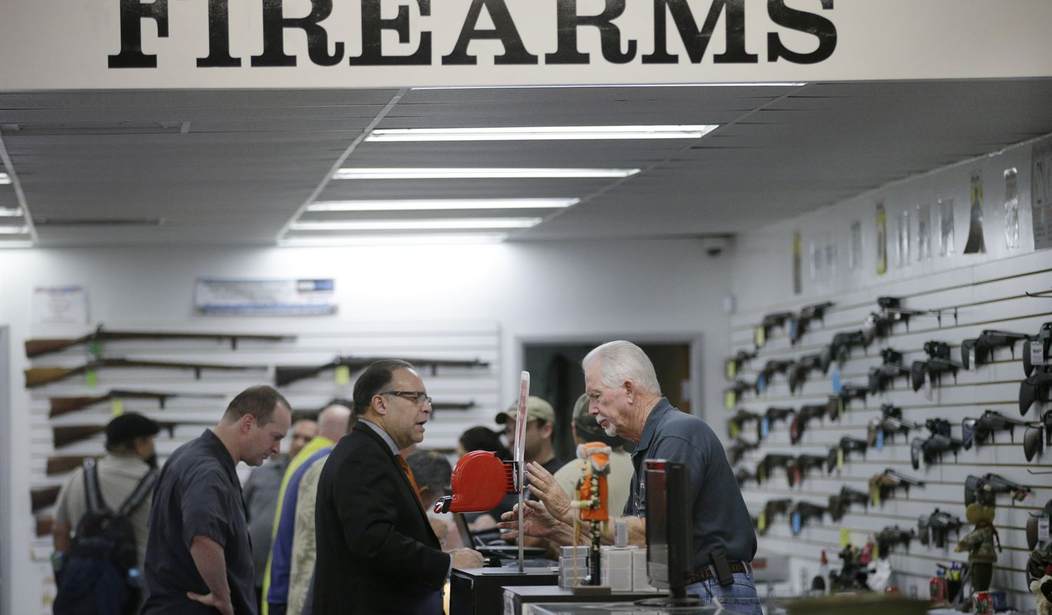There’s more than one type of media bias when it comes to reporting on gun issues and the gun control debate. Sometimes the bias comes in the form of omission; reporters and news outlets leaving out important information and details that pose problems for an anti-gun point of view. Other times, the bias takes the form of slanted reporting; referring to “gun safety” instead “gun control,” for instance.
In the case of a new Associated Press report on the shootings in Colorado and Georgia, both kinds of bias are on display, beginning with the story’s headline: Mass Shooters Exploited Gun Laws, Loopholes Before Carnage.
The suspect in the shooting at a Boulder, Colorado, supermarket was convicted of assaulting a high school classmate but still got a gun. The man accused of opening fire on three massage businesses in the Atlanta area bought his gun just hours before the attack — no waiting required.
They are just the latest suspected U.S. mass shooters to obtain guns because of limited firearms laws, background check lapses or law enforcement’s failure to heed warnings of concerning behavior.
The framing of the AP story suggests that, if only gun laws were changed, these murders wouldn’t have happened, leaving out any discussion of how any changes might impact those Americans who want to exercise their right to keep and bear arms and have no desire or intent to wantonly murder innocent people.
The story then goes through a list of individuals responsible for mass shootings in recent years, detailing how and why they were able to purchase a firearm. In the vast majority of cases, the answer is simple: they weren’t prohibited by law from doing so. The Boulder shooting suspect, for instance, was convicted of a misdemeanor offense back in high school and was sentenced to probation. The suspect in the Georgia killings of eight people had no previous run-ins with the law, and like the Boulder suspect, purchased his firearm after going through a background check.
In fact, in the list of 19 mass shooting suspects (and those convicted of their crimes) dating back to 2012, the AP found that 13 of them were legally eligible to purchase a firearm, and passed a background check before doing so. Two cases involved killers stealing firearms that had been legally purchased by parents, two cases involved individuals who were prohibited from legally owning guns but were able to pass a background check because of failures by government agencies to submit the disqualifying information to the NICS system, one case involved a straw purchase of a firearm, and one case involved a man who purchased a gun through a private sale.
So what “loopholes” did these killers exploit? Despite the headline, the Associated Press doesn’t say. Do they believe that anyone who’s ever gone to therapy should be barred from owning a firearm? Do they believe that a high school fight that results in a misdemeanor conviction should result in the automatic lifetime prohibition on gun ownership? What about a suspension in high school?
Here’s how hard the Associated Press is reaching to try to make the case that more gun control laws would be effective in preventing mass shootings:
Patrick Crusius bought an AK-47-style rifle and 1,000 rounds of hollow-point ammunition online 45 days before the Walmart attack, prosecutors said. A Crusius family lawyer said his mother raised concerns about the purchase in a call to police on June 27. Police said she asked if Crusius, who was 21 at the time, was old enough to buy a gun. Police said she was assured he was and that he’d qualify if he passed a background check. Police said she expressed concern only about his safety and said she’d seen no recent change in his behavior. Texas does not have the kind of “red flag law” that in other states allows courts to take guns from people posing immediate danger. Crusius posted a racist screed online just before the attack and appeared to target Mexicans. He’s charged with capital murder in Texas and federal hate crimes and firearms offenses.
The AP notes ominously that Texas doesn’t have a red flag law, though a few paragraphs earlier, when discussing the suspect in the Boulder shooting, they neglected to to point out that Colorado does, but the family of the suspect in the Boulder shooting never tried to use it. In the case of the suspect in the El Paso Walmart shooting, while the suspect’s mother called police because she was concerned about the gun purchase, she also never indicated that she thought he was a danger to anyone else.
That’s not a loophole, unless you believe that adults should be denied their ability to purchase a firearm (or have their firearms confiscated) because a parent is bothered by their gun ownership. I know plenty of gun owners whose parents are anti-gun, and might very well try to take their guns away if all it took was a phone call to police.
In order to close all of the imaginary loopholes the Associated Press thinks it discovered, we would have to bar gun possession to anybody who got into a fight in school, was suspended, or has undergone outpatient mental health treatment. Considering that 99.99% of the tens of millions of Americans who have one or more of those experiences in their past don’t go on to become mass murderers, it seems to me like banning all of those folks from legally possessing a firearm would do far more damage to our rights than it would improve our public safety.
The AP may have set out to demonstrate dangerous loopholes in our current laws, but what they really showed us a dangerous mentality; that we can ban our way to safety by restricting the rights of American citizens on the off chance that we’ll stop a killer.









